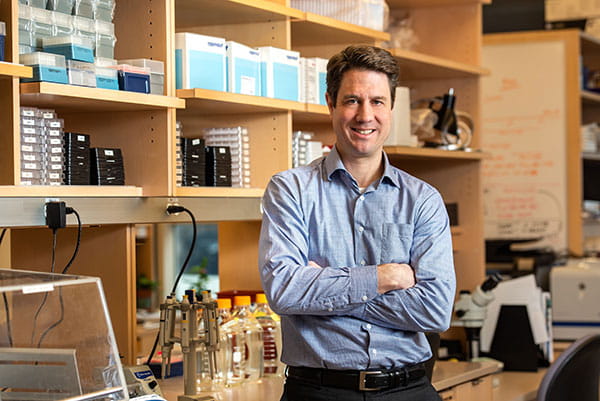Research on How the Brain's Health is Affected by Aging
January 20, 2019
$9.6 million grant will fund unique look at age-related cognitive decline
Innovations in Neurology & Neurosurgery - Winter 2019
Researchers at University Hospitals in Cleveland have received a $9.6 million grant for their research into brain health related to aging. The award is one of three major grants funded by the American Heart Association-Allen Initiative in Brain Health and Cognitive Impairment, a new collaborative funding initiative, and was announced at the AHA’s annual meeting in November.
UH researchers will use the funding to identify new ways to protect people from cognitive decline with aging. Although the team’s work will have many implications for Alzheimer’s disease, their approach is designed to address ways to globally enhance general brain health with aging, Andrew A. Pieper, MD, PhD, Director of Neurotherapeutic Discovery at UH Harrington Discovery Institute and co-director of the grant.
 Andrew Pieper, MD, PhD
Andrew Pieper, MD, PhDCOMPLEMENTARY EXPERTISE
Mukesh K. Jain, MD, will lead the UH research team. Dr. Jain is the Chief Academic Officer for UH, Chief Scientific Officer for UH and UH Harrington Discovery Institute at University Hospitals in Cleveland, Ohio – part of The Harrington Project for Discovery & Development. He is also Chief Research Officer for UH Harrington Heart & Vascular Institute. In addition to Dr. Pieper, the team includes Jonathan Stamler, MD, president of the Harrington Discovery Institute, and researchers from the UH Harrington Heart & Vascular Institute, Johns Hopkins University and University of Pennsylvania.
Having a team with complementary expertise will allow UH researchers to address the problem of cognitive decline in unique ways, Dr. Pieper says. For example, his experience in the realm of neuroprotection pairs well with Dr. Jain’s expertise in transcriptional biology in the vascular endothelium.
“Dr. Jain has made groundbreaking discoveries in understanding the processes that control the health of vascular endothelial cells,” Dr. Pieper says.
The team will work to better understand the interface between the cardiovascular system and the brain, known as the neurovascular unit. This interface is where the blood vascular system terminates in the brain and is composed of cells from both the brain and the vascular system. These cells interact in unique ways distinct from their separate functions in the brain and vascular system.
“Our combined approach is to study how cells of the neurovascular unit communicate and support one another as we age, so we can find ways to preserve and improve brain health over a person’s life span,” Dr. Pieper explains.
Researchers will use genetically engineered animal models of dementia and vasculature disease to specifically interrogate the interplay between the cells that compose the neurovascular unit.
Dr. Pieper explains, “Our goal is to meaningfully advance our basic science understanding of the physiological role of the neurovascular unit in brain aging and dementia, and to also provide new opportunities for therapeutic intervention.”UH scientists have teamed up with physician-scientists at the University of Pennsylvania and John Hopkins University who have additional expertise in vascular health and gasotransmitter signaling, respectively. In addition, other collaborators at the University of Pennsylvania will use large collections of clinical tissue from patients with dementia to determine whether the findings in animals correlate with the human condition. UH colleague Alan Lerner, MD, is involved in that aspect of the program.
INTERDISCIPLINARY TEAM
The interdisciplinary nature of the team UH has assembled not only benefits its work. It’s a big part of the reason UH received the grant, Dr. Pieper says.
“We are approaching the problem from two sides — the cardiovascular system and the brain — and seeking the point of convergence where we think we can make a unique contribution that neither individual field would make on its own,” he says. “Combining the focus and expertise of cardiovascular physiology and neuropsychiatry is a unique approach to studying this important problem.”
Discoveries that have already been made in his lab on therapeutically optimizing cellular energy levels, and in Dr. Stamler’s lab on optimizing the function of red blood cells at the neurovascular unit, also further enhance the team’s ability to advance new therapeutic options for brain health, Dr. Pieper says.
“Through this unique funding mechanism, we now have the golden opportunity to converge our large body of basic science and clinical expertise,” he says. “We can make new discoveries that wouldn’t be made otherwise, with the ultimate goal of advancing patient care in the realm of brain health.”
Contact Andrew Pieper at Andrew.Pieper@HarringtonDiscovery.org.


